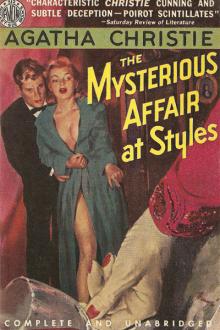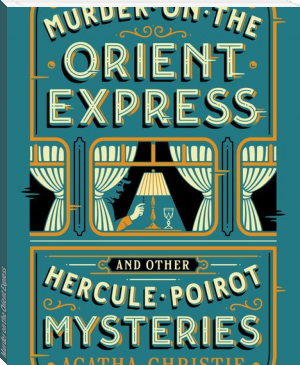The Mysterious Affair at Styles - Agatha Christie (e reading malayalam books .txt) 📗

- Author: Agatha Christie
- Performer: 1579126227
Book online «The Mysterious Affair at Styles - Agatha Christie (e reading malayalam books .txt) 📗». Author Agatha Christie
Just before tea, I strolled down to tell Poirot of the new disappointment, but found, to my annoyance, that he was once more out.
“Gone to London again?”
“Oh, no, monsieur, he has but taken the train to Tadminster. ‘To see a young lady’s dispensary,’ he said.”
“Silly ass!” I ejaculated. “I told him Wednesday was the one day she wasn’t there! Well, tell him to look us up to-morrow morning, will you?”
“Certainly, monsieur.”
But, on the following day, no sign of Poirot. I was getting angry. He was really treating us in the most cavalier fashion.
After lunch, Lawrence drew me aside, and asked if I was going down to see him.
“No, I don’t think I shall. He can come up here if he wants to see us.”
“Oh!” Lawrence looked indeterminate. Something unusually nervous and excited in his manner roused my curiosity.
“What is it?” I asked. “I could go if there’s anything special.”
“It’s nothing much, but—well, if you are going, will you tell him—” he dropped his voice to a whisper—“I think I’ve found the extra coffee-cup!”
I had almost forgotten that enigmatical message of Poirot’s, but now my curiosity was aroused afresh.
Lawrence would say no more, so I decided that I would descend from my high horse, and once more seek out Poirot at Leastways Cottage.
This time I was received with a smile. Monsieur Poirot was within. Would I mount? I mounted accordingly.
Poirot was sitting by the table, his head buried in his hands. He sprang up at my entrance.
“What is it?” I asked solicitously. “You are not ill, I trust?”
“No, no, not ill. But I decide an affair of great moment.”
“Whether to catch the criminal or not?” I asked facetiously.
But, to my great surprise, Poirot nodded gravely.
” ‘To speak or not to speak,’ as your so great Shakespeare says, ‘that is the question.’ “
I did not trouble to correct the quotation.
“You are not serious, Poirot?”
“I am of the most serious. For the most serious of all things hangs in the balance.”
“And that is?”
“A woman’s happiness, mon ami,” he said gravely.
I did not quite know what to say.
“The moment has come,” said Poirot thoughtfully, “and I do not know what to do. For, see you, it is a big stake for which I play. No one but I, Hercule Poirot, would attempt it!” And he tapped himself proudly on the breast.
After pausing a few minutes respectfully, so as not to spoil his effect, I gave him Lawrence’s message.
“Aha!” he cried. “So he has found the extra coffee-cup. That is good. He has more intelligence than would appear, this long-faced Monsieur Lawrence of yours!”
I did not myself think very highly of Lawrence’s intelligence; but I forebore to contradict Poirot, and gently took him to task for forgetting my instructions as to which were Cynthia’s days off.
“It is true. I have the head of a sieve. However, the other young lady was most kind. She was sorry for my disappointment, and showed me everything in the kindest way.”
“Oh, well, that’s all right, then, and you must go to tea with Cynthia another day.”
I told him about the letter.
“I am sorry for that,” he said. “I always had hopes of that letter. But no, it was not to be. This affair must all be unravelled from within.” He tapped his forehead. “These little grey cells. It is ‘up to them’—as you say over here.” Then, suddenly, he asked: “Are you a judge of finger-marks, my friend?”
“No,” I said, rather surprised, “I know that there are no two finger-marks alike, but that’s as far as my science goes.”
“Exactly.”
He unlocked a little drawer, and took out some photographs which he laid on the table.
“I have numbered them, 1, 2, 3. Will you describe them to me?”
I studied the proofs attentively.
“All greatly magnified, I see. No. 1, I should say, are a man’s finger-prints; thumb and first finger. No. 2 are a lady’s; they are much smaller, and quite different in every way. No. 3”—I paused for some time—“there seem to be a lot of confused finger-marks, but here, very distinctly, are No. 1’s.”
“Overlapping the others?”
“Yes.”
“You recognize them beyond fail?”
“Oh, yes; they are identical.”
Poirot nodded, and gently taking the photographs from me locked them up again.
“I suppose,” I said, “that as usual, you are not going to explain?”
“On the contrary. No. 1 were the finger-prints of Monsieur Lawrence. No. 2 were those of Mademoiselle Cynthia. They are not important. I merely obtained them for comparison. No. 3 is a little more complicated.”
“Yes?”
“It is, as you see, highly magnified. You may have noticed a sort of blur extending all across the picture. I will not describe to you the special apparatus, dusting powder, etc., which I used. It is a well-known process to the police, and by means of it you can obtain a photograph of the finger-prints of any object in a very short space of time. Well, my friend, you have seen the finger-marks—it remains to tell you the particular object on which they had been left.”
“Go on—I am really excited.”
“Eh bien! Photo No. 3 represents the highly magnified surface of a tiny bottle in the top poison cupboard of the dispensary in the Red Cross Hospital at Tadminster—which sounds like the house that Jack built!”
“Good heavens!” I exclaimed. “But what were Lawrence Cavendish’s finger-marks doing on it? He never went near the poison cupboard the day we were there!”
“Oh, yes, he did!”
“Impossible! We were all together the whole time.”
Poirot shook his head.
“No, my friend, there was a moment when you were not all together. There was a moment when you could not have been all together, or it would not have been necessary to call to Monsieur Lawrence to come and join you on the balcony.”
“I’d forgotten that,” I admitted. “But it was only for a moment.”
“Long enough.”
“Long enough for what?”
Poirot’s smile became rather enigmatical.
“Long enough for a gentleman who had once studied medicine to gratify a very natural interest and curiosity.”
Our eyes met. Poirot’s were pleasantly vague. He got up and hummed a little tune. I watched him suspiciously.
“Poirot,” I said, “what was in this particular little bottle?”
Poirot looked out of the window.
“Hydrochloride of strychnine,” he said, over his shoulder, continuing to hum.
“Good heavens!” I said it quite quietly. I was not surprised. I had expected that answer.
“They use the pure hydro-chloride of strychnine very little— only occasionally for pills. It is the official solution, Liq. Strychnine Hydro-clor. that is used in most medicines. That is why the finger-marks have remained undisturbed since then.”
“How did you manage to take this photograph?”
“I dropped my hat from the balcony,” explained Poirot simply. “Visitors were not permitted below at that hour, so, in spite of my many apologies, Mademoiselle Cynthia’s colleague had to go down and fetch it for me.”
“Then you knew what you were going to find?”
“No, not at all. I merely realized that it was possible, from your story, for Monsieur Lawrence to go to the poison cupboard. The possibility had to be confirmed, or eliminated.”
“Poirot,” I said, “your gaiety does not deceive me. This is a very important discovery.”
“I do not know,” said Poirot. “But one thing does strike me. No doubt it has struck you too.”
“What is that?”
“Why, that there is altogether too much strychnine about this case. This is the third time we run up against it. There was strychnine in Mrs. Inglethorp’s tonic. There is the strychnine sold across the counter at Styles St. Mary by Mace. Now we have more strychnine, handled by one of the household. It is confusing; and, as you know, I do not like confusion.”
Before I could reply, one of the other Belgians opened the door and stuck his head in.
“There is a lady below, asking for Mr Hastings.”
“A lady?”
I jumped up. Poirot followed me down the narrow stairs. Mary Cavendish was standing in the doorway.
“I have been visiting an old woman in the village,” she explained, “and as Lawrence told me you were with Monsieur Poirot I thought I would call for you.”
“Alas, madame,” said Poirot, “I thought you had come to honour me with a visit!”
“I will some day, if you ask me,” she promised him, smiling.
“That is well. If you should need a father confessor, madame” —she started ever so slightly—“remember, Papa Poirot is always at your service.”
She stared at him for a few minutes, as though seeking to read some deeper meaning into his words. Then she turned abruptly away.
“Come, will you not walk back with us too, Monsieur Poirot?”
“Enchanted, madame.”
All the way to Styles, Mary talked fast and feverishly. It struck me that in some way she was nervous of Poirot’s eyes.
The weather had broken, and the sharp wind was almost autumnal in its shrewishness. Mary shivered a little, and buttoned her black sports coat closer. The wind through the trees made a mournful noise, like some great giant sighing.
We walked up to the great door of Styles, and at once the knowledge came to us that something was wrong.
Dorcas came running out to meet us. She was crying and wringing her hands. I was aware of other servants huddled together in the background, all eyes and ears.
“Oh, m’am! Oh, m’am! I don’t know how to tell you—”
“What is it, Dorcas?” I asked impatiently. “Tell us at once.”
“It’s those wicked detectives. They’ve arrested him—they’ve arrested Mr. Cavendish!”
“Arrested Lawrence?” I gasped.
I saw a strange look come into Dorcas’s eyes.
“No, sir. Not Mr. Lawrence—Mr. John.”
Behind me, with a wild cry, Mary Cavendish fell heavily against me, and as I turned to catch her I met the quiet triumph in Poirot’s eyes.
CHAPTER XI.
THE CASE FOR THE PROSECUTIONThe trial of John Cavendish for the murder of his stepmother took place two months later.
Of the intervening weeks I will say little, but my admiration and sympathy went out unfeignedly to Mary Cavendish. She ranged herself passionately on her husband’s side, scorning the mere idea of his guilt, and fought for him tooth and nail.
I expressed my admiration to Poirot, and he nodded thoughtfully.
“Yes, she is of those women who show at their best in adversity. It brings out all that is sweetest and truest in them. Her pride and her jealousy have—”
“Jealousy?” I queried.
“Yes. Have you not realized that she is an unusually jealous woman? As I was saying, her pride and jealousy have been laid aside. She thinks of nothing but her husband, and the terrible fate that is hanging over him.”
He spoke very feelingly, and I looked at him earnestly, remembering that last afternoon, when he had been deliberating whether or not to speak. With his tenderness for “a woman’s happiness,” I felt glad that the decision had been taken out of his hands.
“Even now,” I said, “I can hardly believe





Comments (0)